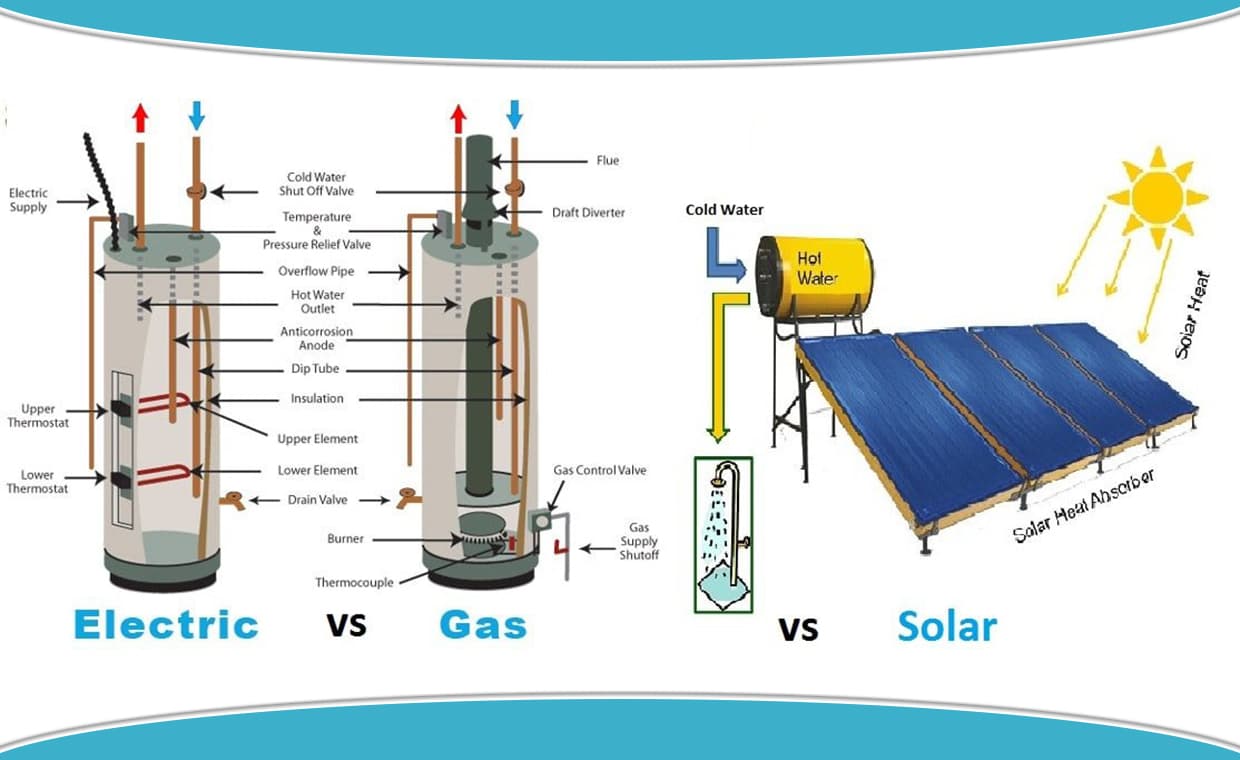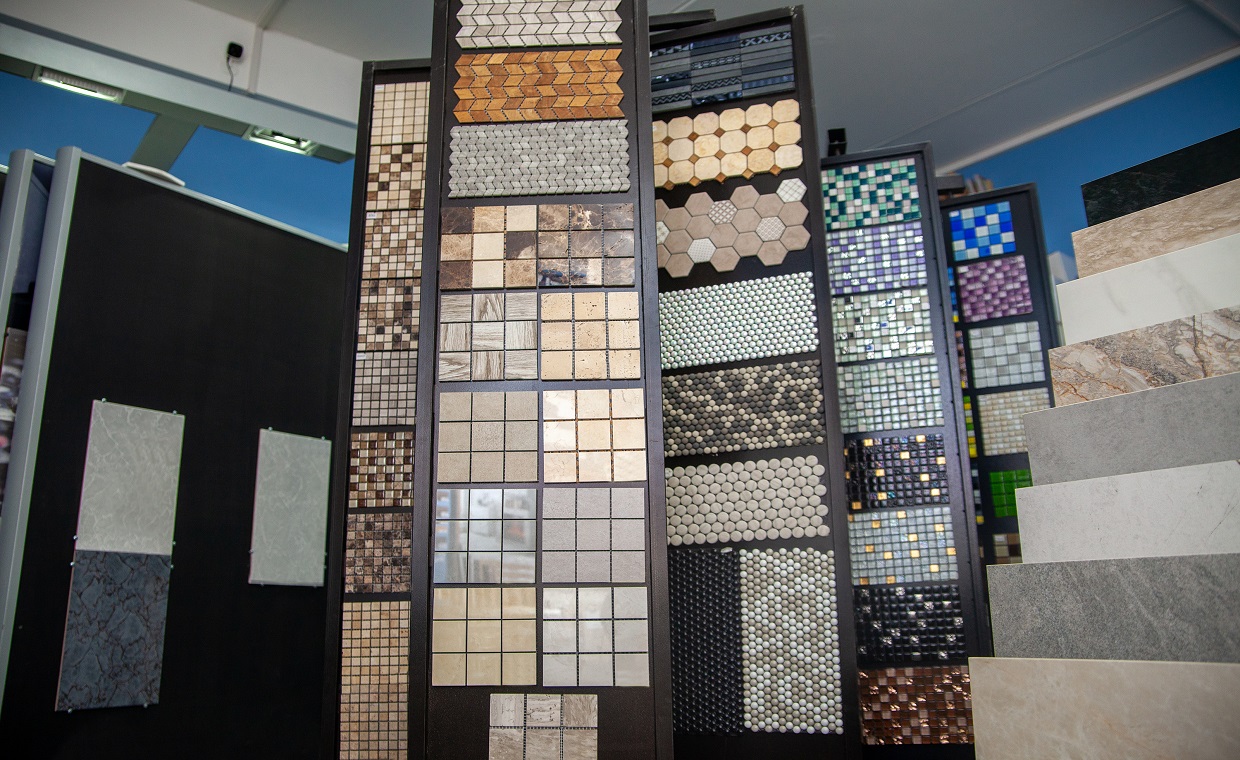
Water heaters are an integral part of hot water system in a house. Hot water system is responsible for heating and delivering hot water safely at various fixtures.
The average per capita daily use of water for drinking, bathing, washing, cleaning and cooking depends on the standard of living but varies from place to place, irrespective of climate. Water heating contributes to 15 and 25 percent of the energy consumed in a house. Water heating cost can be managed by selecting the appropriate fuel and water heater type. Water heaters are either electrically operated or fuel (wood, charcoal, gas, oil, solar) operated or even can be renewable type i.e. solar. Water heaters should be selected wisely in order to minimize the wastage of energy and optimize the use of hot water.
Here we will compare an electric water heater, gas water heater and a solar water heater.
About
Electric Water Heater
- Electric water heater can be either storage or instantaneous type that uses electricity to heat water for hot water supply in a house
Gas Water Heater
- A GAS water heater can be either storage or instantaneous water heater that uses natural gas or LPG to heat water for hot water supply in a house.
Solar Water Heater
- A solar water heater is a storage tank water heater which uses the heat energy from sun to heat water for hot water supply in a house.
Principle
Electric Water Heater
- Electric energy is converted into heat energy.
Gas Water Heater
- Natural gas or LPG is burnt. This combustion produces heat energy.
Solar Water Heater
- The light radiations from the sun are converted into heat energy. Collector plates (panels) collect sun rays incident on them and converts them into heat energy. This heat energy is then transferred to water passing through tubes underneath collector plates.
Components
Electric Water Heater
Storage Heater
- Insulated storage tank
- heating element
- water connections (inlet/outlet)
- thermostat
Instantaneous Heater
- insulated vessel
- heat exchanger
- water connections
Gas Water Heater
Storage Heater
- Insulated storage tank
- burner
- fuel (natural gas or LPG)
- water connections
- thermostat
Instantaneous Heater
- insulated vessel
- heat exchanger
- burner
- fuel (natural gas or LPG)
- water connections
Solar Water Heater
- collector to collect solar energy
- Insulated storage tank to store hot water
Pros
Electric Water Heater
- No local emissions
- No carbon monoxide as no combustion
- No gas leaks
- Easy installation
- Less expensive to purchase and install
- The Cost of Setup is less as no vent pipe needed (no combustion of fuel)
- It can be confined in small spaces avoiding the expense on excess floor space
- It is safe against explosion
- It loses only 1% of stored heat per hour
- Requires less maintenance
Gas Water Heater
- Provides instant heat
- Cheaper to run as gas is cheap
- Heats water faster than other heaters
- Flow rate is more
- Reduces the wait for hot water
- More suitable for larger families
- Easier to repair
- Gas water heaters that ignite with pilot light and not with electric ignition will work even when power goes out
Solar Water Heater
- Solar heaters use free natural resource, saving on electricity bill
- Solar is renewable and clean energy source
- Easy to install and very less maintenance
- They are efficient, about 80% of radiation is converted into heat energy
- Have longer life
- More suitable for larger families
- At few places user will be paid for generating own heat energy with renewable resource (sun) by government
- Water is heated on cloudy days too, as heater uses diffused energy in the atmosphere to heat the water
- Hot Water is available even during power cut
Cons
Electric Water Heater
- Expensive to operate
- It takes some time to heat water.
- It has less flow rate
- There is a potential danger of a short circuit or a fuse blow-off
Gas Water Heater
- Excess gas is wasted for burning pilot light.
- Requires additional space to accommodate LPG cylinder and proper ventilation if runs on unpiped supply.
- Releases carbon monoxide
- Chances of gas hazards due to gas leakage
- It requires at least 6 – 18 inches of ventilation on all sides and top
- Gas water heater lose about 3.5% of their stored heat per hour
- Requires more maintenance due to a combustion process
- Burners and flues are subjected to corrosion and mechanical damage
Solar Water Heater
- Need additional rooftop space to install a solar water heater
- Working of solar heaters depends on the availability of sunlight
- Needs annual maintenance
- Does not deliver hot water around the year. Therefore backup is necessary in cloudy days.
Also Read:
Domestic Water Supply System
Selection of Pipes for Hot Water
Image Courtesy: Image 1, Image 2
Author Bio
Nidhi Patel – Civil Engineer































